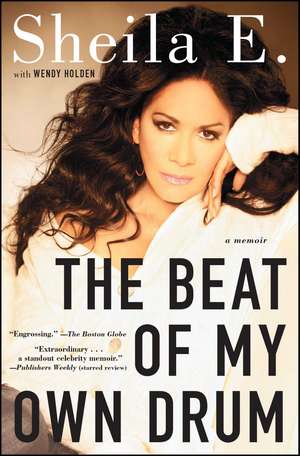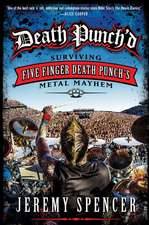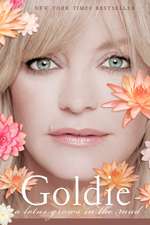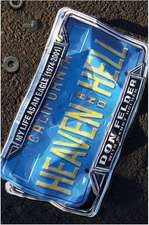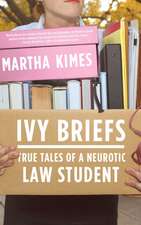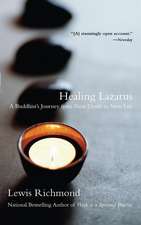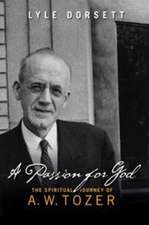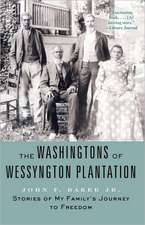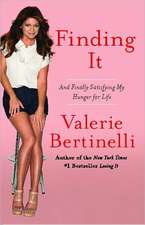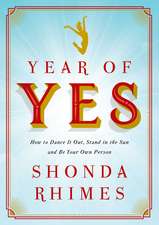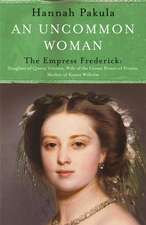The Beat of My Own Drum: A Memoir
Autor Sheila E. Cu Wendy Holdenen Limba Engleză Paperback – 2 iul 2015
The Beat of My Own Drumis both a walk through four decades of Latin and pop music-from her tours with Marvin Gaye, Lionel Richie, Prince, and Ringo Starr-to her own solo career. At the same time, it's also a heart-breaking, ultimately redemptive look at how the sanctity of music can save a person's life. Having endured sexual abuse as a child, Sheila credits her parents, music, and God with giving her the will to carry on and to build a lasting legacy. Rich in musical detail, pop and Latin music history from the '70s and '80s, and Sheila's personal story, this memoir is a unique glimpse into a drummer's singular life-a treat for both new and long-time fans of Sheila E. And above all, it is a testament to how the positive power of music serves as the heartbeat of her life.
Preț: 119.61 lei
Nou
Puncte Express: 179
Preț estimativ în valută:
22.89€ • 24.86$ • 19.23£
22.89€ • 24.86$ • 19.23£
Carte disponibilă
Livrare economică 01-15 aprilie
Preluare comenzi: 021 569.72.76
Specificații
ISBN-13: 9781476714967
ISBN-10: 1476714967
Pagini: 336
Ilustrații: 8-pg 4-C insert
Dimensiuni: 140 x 216 x 20 mm
Greutate: 0.3 kg
Editura: ATRIA
Colecția Atria Books
ISBN-10: 1476714967
Pagini: 336
Ilustrații: 8-pg 4-C insert
Dimensiuni: 140 x 216 x 20 mm
Greutate: 0.3 kg
Editura: ATRIA
Colecția Atria Books
Notă biografică
Emmy and Grammy Award–nominee Sheila E. is one of the most talented percussionist/drummers in the world. She became a top session and touring musician before the age of twenty, performing and/or recording with George Duke, Herbie Hancock, Billy Cobham, Con Funk Shun, and countless others. She later performed with Marvin Gaye on his final world tour, Diana Ross, Lionel Richie, Prince, Gloria Estefan, Babyface, Patti LaBelle, and Stevie Nicks, among others. In the 1980s, Sheila became a pop sensation with her hits “The Glamorous Life” and “A Love Bizarre.” Sheila founded the Elevate Hope Foundation and cofounded Elevate Oakland, both of which focus on the needs of victims of child abuse by promoting music as an alternative form of therapy and serving public schools with music and the arts.
Wendy Holden is the author of more than thirty books, nine of which were international bestsellers. She also worked as a journalist for eighteen years.
Wendy Holden is the author of more than thirty books, nine of which were international bestsellers. She also worked as a journalist for eighteen years.
Extras
The Beat of My Own Drum
You came into my life
In time
That moment I knew
We would share our dreams
And so it seems
That dreams do come true
“NINA”
THE E FAMILY (WRITTEN BY PETE ESCOVEDO)
I could hear the beat as I approached the stage. The connection between the music and me felt like it was in my DNA. The cymbals vibrated through my body and the timbales shook my bones. My father’s conga playing touched me somewhere deep within my soul.
“You were kicking in time to the percussion inside your mom’s belly!” he’d tell me with a chuckle. “After you were born I took you to clubs in a bassinet and hid you behind the bar!”
It was no wonder that the pounding of his drums felt like the heartbeat of my life.
The preparations for my first live performance that night in 1962 had taken more than an hour at my grandparents’ house on Thirty-third and Market Street in West Oakland, California. Some of my older cousins had gathered around to watch, curious, as Moms dressed me up.
I was five years old.
When she helped me into a new white dress with a frilly lace hem, I knew that it had to be a special occasion. I only ever wore dresses for fancy events like birthday parties or going to church on Sundays.
Mama—my Creole grandmother, who was what they called “light skin,” with dyed black hair, stockings rolled to the knee, and never without her apron, sat rocking in her chair with a grin as Moms fixed my hair and tied a white ribbon into my almost shoulder-length curls.
The prettier she made me look, the more my cousins complained. “This isn’t fair,” they whined. “How come Sheila gets to go and we can’t?”
My mother told them they weren’t old enough to go to a nightclub. They must have been between six and ten years old.
“But she’s younger than us!” they protested in unison.
“Yes,” Moms countered quickly. “But this is a special night—Sheila’s going to go perform with her father.”
I looked up into her face, wide-eyed. “I’m gonna play with Daddy?”
She nodded.
I smiled. I didn’t feel fazed by the news at all. I played with Pops all the time at home, stepping up to his congas (with the help of a chair) and hammering out a rhythm with my tiny hands.
Even when he wasn’t around, I’d create music from any thing—beating on pots and pans, a window, a wall, a table, or my chest. Moms and Pops said that each time a Jiffy peanut-butter commercial came on TV, I’d run to the old Zenith set (that looked like something from a spaceship) and tap on the screen in time to the rhythm. The tune had a melody and beat that captured my attention.
Eventually, my persistence wore down the grown-ups. Pops and his friends would laughingly concede and let me join in one of their daily jamming sessions.
“Come and play, Sheila,” they’d say. I had no idea that many of them were famous musicians—they were just Pops’s friends—and they didn’t need to ask me twice. Sitting on the congas opposite my father, I’d mimic his hand movements as if I was looking in a mirror. I’d watch him practice, and I’d practice along with him. I guess he’d decided I was ready to go public.
Moms folded over the ruffled lining of my white socks and slipped me into shiny patent leather shoes with silver buckles. They were uncomfortably new. I arched my feet to test their flexibility and winced a little when they pinched.
“I’ll get ready and then we’ll go,” she told me, stroking my cheek with the back of her hand.
I loved all the attention she was paying me.
I loved that I was going to play with Pops.
I loved that I didn’t hurt anymore.
Everything was still very muddled in my head, but that night she was getting me ready can’t have been long after the Bad Thing happened.
The thing nobody talked about.
The thing that made me so sick inside.
I didn’t realize it at the time, but letting me play with Pops and his Escovedo Brothers Latin Jazz Sextet must have been some kind of reward.
Not that my parents chose to see it that way. “You were a natural real young,” they’d say firmly. “We just thought it would be fun for you to show everyone what you could do.” Even now, more than fifty years later, they find what happened back then almost impossible to talk about.
No matter what the reason for my first performance that night, it is true that a day never passed in our house without music being played. The words “I want to be a musician” never came from my mouth, though. I didn’t even think about it.
In fact, later on, once I’d witnessed the first moon landings (which seemed almost impossible to believe), I had my heart set on becoming an astronaut. I was so excited by the idea; I wanted to know everything about space and the enormity of the universe. I wanted to learn to fly an aircraft. I wanted to fly to the moon. Being my mother’s daughter, I didn’t want to have to wait to be a grown-up to do it. Oh, no. I didn’t want to be the first woman to step onto the lunar surface. I wanted to be the first little girl on the moon. Later, I switched ambitions and decided I’d win an Olympic gold medal for running track. I had a clear vision in my head of crossing the finish line as the crowd roared, then standing on the podium as the national anthem was played, my medal heavy around my neck.
It never occurred to me that I might not be able to do both, or either.
The one thing that made me truly happy, though, was music. I loved every kind of music, from classical to Motown, and Latin jazz especially touched my heart. But whether I was listening to Pops practicing, tapping away to a Miles Davis record, or watching Karen Carpenter beating her drums, those were the times when I’d close my eyes and lose myself—not realizing that music was going to become my passion and my purpose.
Those times were when I was able to forget.
I don’t remember how we traveled to the venue of my first public performance that warm summer night, though we must have driven. I seem to recall Moms opening the back door of her car for me to get out, and frowning because there was already a crease in my new shoes.
The historic Sweet’s Ballroom in Oakland was several miles away from where we lived in an apartment we were soon to be kicked out of for not paying the rent. Not that I minded moving again one little bit—I couldn’t wait to get away from that house, which I was beginning to think was cursed.
What I do recall about that night at Sweet’s—so vividly I can almost smell the cigarette smoke—is holding Moms’s hand as we climbed the grand staircase to where the music was playing.
Being only five years old, I was still small, and my arm was fully extended as I gripped my mother’s fingers. Moms looked so beautiful in her blouse and pants, with her hair teased up at the top. I felt as if I was in the presence of an angel that night. She seemed so light and luminous that I thought she might float away unless I held on tight.
When we reached the top of the red-carpeted stairs, we turned left and faced an enormous art deco ballroom, complete with a high ceiling and polished hardwood floor.
My eyes wide, I gazed around me in wonder.
There was a balcony upstairs and plush banquette seating to the side. On the dance floor, hundreds of people were swaying to the music being played by a band way up front on a stage. Everyone looked so smartly dressed compared to the adults I usually saw hanging round our apartment wearing tie-dyed shirts and bell-bottom jeans.
The music was very loud—even louder than at home—and the place was packed. The heat from all those bodies made me break out in a sweat as my heart began hammering a beat of its own against my rib cage and butterflies began dancing in my tummy.
When the band stopped playing, there was an enthusiastic round of applause along with some loud whistling. Moms waved at Pops, and he yelled at someone on the stage, “Juanita’s here!”
The next part remains frozen in slow motion in my memory.
Pops’s voice boomed out of the speakers as he announced, “Hey, ladies and gents, my wife has just arrived and is over by the entrance. My daughter Sheila’s with her tonight, and she’s going to come up and play for you, so I want you to give her a big Bay Area welcome, okay?”
As if by magic, everybody swiveled around to face us, and there was a thunderous clapping and stamping of feet. They all stepped aside to create a perfect polished pathway to the stage. It was like Moses parting the Red Sea.
Everyone in that big old room seemed to gasp when they caught sight of how little I was. Men and women reached out to touch my head or pat me on the back, cooing “Aaah!” as Moms led me through a forest of legs.
Straight ahead of me, the high stage was bathed in pretty colored lights. I spotted Uncle Coke sitting behind his timbales and my Uncle Phil on bass. Pops stood at the front, beaming down at me. As ever, he was dressed in a suit and tie, and I felt proud to have the smartest dad in the room.
As Moms and I continued what felt like a royal procession, the crowd packed back in around us and shuffled forward too. When I turned to look behind me, I couldn’t see the entrance anymore.
Once we reached the stage, Moms scooped me up in her arms and lifted me into the air, my shiny shoes dangling for everyone to see. All eyes were on me as Pops took me from her and held my hand as he led me to where he’d just been playing the congas. The crowd continued to cheer as he lifted me onto the chair so that I was standing on it.
As soon as I was up on that stage, the butterflies in my stomach started to dance again. This was not a familiar setup for me. Although I was with Pops, my uncles, and our friends doing what we always did, I’d never done it in front of an audience before.
Under hot, bright lights I stood behind the congas and waited for my cue. I knew that all I had to do was let them start playing, find a gap, and join in. Like my father, I didn’t read music. I just played by the instinct deep in my gut.
I played from my heart.
“Go with what you feel, baby, okay?” was the only instruction Pops gave me that night before signaling to the band. The song began, and after a few beats, so did I. Pops stayed close and I followed his lead. I don’t recall what song it was—all my focus was on Pops.
I must have lost myself then, because I don’t remember anything else after he counted me in. People tell me that I played—I mean really played. With Pops’s encouragement, I even launched into my first-ever solo. It was completely ad lib. And the audience went crazy.
Moms stood right up front in the crowd, jumping up and down, clapping and yelling enthusiastically. She put four fingers in her mouth and whistled loudly. Creole by birth and by nature, the woman who’d been born Juanita Marie Gardere had an indomitable spirit. She was the person who taught me that I could do anything, be anything—survive anything. Having grown up with seven siblings who were stars at basketball, baseball, and running track, she learned early on how to be strong, stubborn, loud, and competitive.
“A girl can do everything and anything a boy can do, and don’t you ever forget that!” she’d insist. We teased her that it was the Gardere part of her talking. Whichever genetic line that competitive, stubborn streak came down, Moms taught me that when it came to trying something new, I shouldn’t be afraid. I hear her ever-present and always encouraging “Amen!” in my head, even now.
So that night in Oakland was my night. It was my chance to shine. That was my moment to feel special. It was a reminder that I was part of something bigger and better than me—or anything that had ever happened to me.
I was blessed to have been born into an amazing family. We might not have been rich and we may occasionally have gone hungry, but we never went unloved. My parents weren’t always able to face up to some of life’s harsher realities, but on that night, they wanted me to know my talent and own it for the first time.
As I closed my eyes and forgot about everything other than creating music, I blew that room away.
I was no longer a five-year-old girl who’d had something bad happen to her.
I was Sheila Escovedo—one day to be known as Sheila E.
I was a musician.
Years later, I asked Pops what he remembered of that gig. He paused, a twinkle in his eye. “You played great,” he said, a smile breaking out and wrinkling the skin around his eyes. “Yep . . . That’s what happened. You played loud and you played fast and the audience loved you.”
Being up on that stage with him at Sweet’s marked the first night of the rest of my life. I didn’t know it then, but it was the one that would eventually shape my entire career.
That was when I realized that I’d not only been given the gift of music, but that it was something that would eventually heal my wounds.
Little did I know how powerful that healing would become . . .
1. Crescendo
The loudest point reached in a gradually increasing sound
You came into my life
In time
That moment I knew
We would share our dreams
And so it seems
That dreams do come true
“NINA”
THE E FAMILY (WRITTEN BY PETE ESCOVEDO)
I could hear the beat as I approached the stage. The connection between the music and me felt like it was in my DNA. The cymbals vibrated through my body and the timbales shook my bones. My father’s conga playing touched me somewhere deep within my soul.
“You were kicking in time to the percussion inside your mom’s belly!” he’d tell me with a chuckle. “After you were born I took you to clubs in a bassinet and hid you behind the bar!”
It was no wonder that the pounding of his drums felt like the heartbeat of my life.
The preparations for my first live performance that night in 1962 had taken more than an hour at my grandparents’ house on Thirty-third and Market Street in West Oakland, California. Some of my older cousins had gathered around to watch, curious, as Moms dressed me up.
I was five years old.
When she helped me into a new white dress with a frilly lace hem, I knew that it had to be a special occasion. I only ever wore dresses for fancy events like birthday parties or going to church on Sundays.
Mama—my Creole grandmother, who was what they called “light skin,” with dyed black hair, stockings rolled to the knee, and never without her apron, sat rocking in her chair with a grin as Moms fixed my hair and tied a white ribbon into my almost shoulder-length curls.
The prettier she made me look, the more my cousins complained. “This isn’t fair,” they whined. “How come Sheila gets to go and we can’t?”
My mother told them they weren’t old enough to go to a nightclub. They must have been between six and ten years old.
“But she’s younger than us!” they protested in unison.
“Yes,” Moms countered quickly. “But this is a special night—Sheila’s going to go perform with her father.”
I looked up into her face, wide-eyed. “I’m gonna play with Daddy?”
She nodded.
I smiled. I didn’t feel fazed by the news at all. I played with Pops all the time at home, stepping up to his congas (with the help of a chair) and hammering out a rhythm with my tiny hands.
Even when he wasn’t around, I’d create music from any thing—beating on pots and pans, a window, a wall, a table, or my chest. Moms and Pops said that each time a Jiffy peanut-butter commercial came on TV, I’d run to the old Zenith set (that looked like something from a spaceship) and tap on the screen in time to the rhythm. The tune had a melody and beat that captured my attention.
Eventually, my persistence wore down the grown-ups. Pops and his friends would laughingly concede and let me join in one of their daily jamming sessions.
“Come and play, Sheila,” they’d say. I had no idea that many of them were famous musicians—they were just Pops’s friends—and they didn’t need to ask me twice. Sitting on the congas opposite my father, I’d mimic his hand movements as if I was looking in a mirror. I’d watch him practice, and I’d practice along with him. I guess he’d decided I was ready to go public.
Moms folded over the ruffled lining of my white socks and slipped me into shiny patent leather shoes with silver buckles. They were uncomfortably new. I arched my feet to test their flexibility and winced a little when they pinched.
“I’ll get ready and then we’ll go,” she told me, stroking my cheek with the back of her hand.
I loved all the attention she was paying me.
I loved that I was going to play with Pops.
I loved that I didn’t hurt anymore.
Everything was still very muddled in my head, but that night she was getting me ready can’t have been long after the Bad Thing happened.
The thing nobody talked about.
The thing that made me so sick inside.
I didn’t realize it at the time, but letting me play with Pops and his Escovedo Brothers Latin Jazz Sextet must have been some kind of reward.
Not that my parents chose to see it that way. “You were a natural real young,” they’d say firmly. “We just thought it would be fun for you to show everyone what you could do.” Even now, more than fifty years later, they find what happened back then almost impossible to talk about.
No matter what the reason for my first performance that night, it is true that a day never passed in our house without music being played. The words “I want to be a musician” never came from my mouth, though. I didn’t even think about it.
In fact, later on, once I’d witnessed the first moon landings (which seemed almost impossible to believe), I had my heart set on becoming an astronaut. I was so excited by the idea; I wanted to know everything about space and the enormity of the universe. I wanted to learn to fly an aircraft. I wanted to fly to the moon. Being my mother’s daughter, I didn’t want to have to wait to be a grown-up to do it. Oh, no. I didn’t want to be the first woman to step onto the lunar surface. I wanted to be the first little girl on the moon. Later, I switched ambitions and decided I’d win an Olympic gold medal for running track. I had a clear vision in my head of crossing the finish line as the crowd roared, then standing on the podium as the national anthem was played, my medal heavy around my neck.
It never occurred to me that I might not be able to do both, or either.
The one thing that made me truly happy, though, was music. I loved every kind of music, from classical to Motown, and Latin jazz especially touched my heart. But whether I was listening to Pops practicing, tapping away to a Miles Davis record, or watching Karen Carpenter beating her drums, those were the times when I’d close my eyes and lose myself—not realizing that music was going to become my passion and my purpose.
Those times were when I was able to forget.
I don’t remember how we traveled to the venue of my first public performance that warm summer night, though we must have driven. I seem to recall Moms opening the back door of her car for me to get out, and frowning because there was already a crease in my new shoes.
The historic Sweet’s Ballroom in Oakland was several miles away from where we lived in an apartment we were soon to be kicked out of for not paying the rent. Not that I minded moving again one little bit—I couldn’t wait to get away from that house, which I was beginning to think was cursed.
What I do recall about that night at Sweet’s—so vividly I can almost smell the cigarette smoke—is holding Moms’s hand as we climbed the grand staircase to where the music was playing.
Being only five years old, I was still small, and my arm was fully extended as I gripped my mother’s fingers. Moms looked so beautiful in her blouse and pants, with her hair teased up at the top. I felt as if I was in the presence of an angel that night. She seemed so light and luminous that I thought she might float away unless I held on tight.
When we reached the top of the red-carpeted stairs, we turned left and faced an enormous art deco ballroom, complete with a high ceiling and polished hardwood floor.
My eyes wide, I gazed around me in wonder.
There was a balcony upstairs and plush banquette seating to the side. On the dance floor, hundreds of people were swaying to the music being played by a band way up front on a stage. Everyone looked so smartly dressed compared to the adults I usually saw hanging round our apartment wearing tie-dyed shirts and bell-bottom jeans.
The music was very loud—even louder than at home—and the place was packed. The heat from all those bodies made me break out in a sweat as my heart began hammering a beat of its own against my rib cage and butterflies began dancing in my tummy.
When the band stopped playing, there was an enthusiastic round of applause along with some loud whistling. Moms waved at Pops, and he yelled at someone on the stage, “Juanita’s here!”
The next part remains frozen in slow motion in my memory.
Pops’s voice boomed out of the speakers as he announced, “Hey, ladies and gents, my wife has just arrived and is over by the entrance. My daughter Sheila’s with her tonight, and she’s going to come up and play for you, so I want you to give her a big Bay Area welcome, okay?”
As if by magic, everybody swiveled around to face us, and there was a thunderous clapping and stamping of feet. They all stepped aside to create a perfect polished pathway to the stage. It was like Moses parting the Red Sea.
Everyone in that big old room seemed to gasp when they caught sight of how little I was. Men and women reached out to touch my head or pat me on the back, cooing “Aaah!” as Moms led me through a forest of legs.
Straight ahead of me, the high stage was bathed in pretty colored lights. I spotted Uncle Coke sitting behind his timbales and my Uncle Phil on bass. Pops stood at the front, beaming down at me. As ever, he was dressed in a suit and tie, and I felt proud to have the smartest dad in the room.
As Moms and I continued what felt like a royal procession, the crowd packed back in around us and shuffled forward too. When I turned to look behind me, I couldn’t see the entrance anymore.
Once we reached the stage, Moms scooped me up in her arms and lifted me into the air, my shiny shoes dangling for everyone to see. All eyes were on me as Pops took me from her and held my hand as he led me to where he’d just been playing the congas. The crowd continued to cheer as he lifted me onto the chair so that I was standing on it.
As soon as I was up on that stage, the butterflies in my stomach started to dance again. This was not a familiar setup for me. Although I was with Pops, my uncles, and our friends doing what we always did, I’d never done it in front of an audience before.
Under hot, bright lights I stood behind the congas and waited for my cue. I knew that all I had to do was let them start playing, find a gap, and join in. Like my father, I didn’t read music. I just played by the instinct deep in my gut.
I played from my heart.
“Go with what you feel, baby, okay?” was the only instruction Pops gave me that night before signaling to the band. The song began, and after a few beats, so did I. Pops stayed close and I followed his lead. I don’t recall what song it was—all my focus was on Pops.
I must have lost myself then, because I don’t remember anything else after he counted me in. People tell me that I played—I mean really played. With Pops’s encouragement, I even launched into my first-ever solo. It was completely ad lib. And the audience went crazy.
Moms stood right up front in the crowd, jumping up and down, clapping and yelling enthusiastically. She put four fingers in her mouth and whistled loudly. Creole by birth and by nature, the woman who’d been born Juanita Marie Gardere had an indomitable spirit. She was the person who taught me that I could do anything, be anything—survive anything. Having grown up with seven siblings who were stars at basketball, baseball, and running track, she learned early on how to be strong, stubborn, loud, and competitive.
“A girl can do everything and anything a boy can do, and don’t you ever forget that!” she’d insist. We teased her that it was the Gardere part of her talking. Whichever genetic line that competitive, stubborn streak came down, Moms taught me that when it came to trying something new, I shouldn’t be afraid. I hear her ever-present and always encouraging “Amen!” in my head, even now.
So that night in Oakland was my night. It was my chance to shine. That was my moment to feel special. It was a reminder that I was part of something bigger and better than me—or anything that had ever happened to me.
I was blessed to have been born into an amazing family. We might not have been rich and we may occasionally have gone hungry, but we never went unloved. My parents weren’t always able to face up to some of life’s harsher realities, but on that night, they wanted me to know my talent and own it for the first time.
As I closed my eyes and forgot about everything other than creating music, I blew that room away.
I was no longer a five-year-old girl who’d had something bad happen to her.
I was Sheila Escovedo—one day to be known as Sheila E.
I was a musician.
Years later, I asked Pops what he remembered of that gig. He paused, a twinkle in his eye. “You played great,” he said, a smile breaking out and wrinkling the skin around his eyes. “Yep . . . That’s what happened. You played loud and you played fast and the audience loved you.”
Being up on that stage with him at Sweet’s marked the first night of the rest of my life. I didn’t know it then, but it was the one that would eventually shape my entire career.
That was when I realized that I’d not only been given the gift of music, but that it was something that would eventually heal my wounds.
Little did I know how powerful that healing would become . . .
Descriere
A moving memoir from Grammy Award nominee Sheila E. about the healing power of music inspired by five decades of life and love on the stage.
